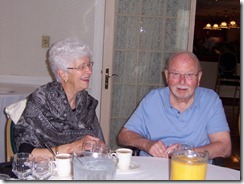 After their retirement, my parents loved to walk along the pathways in the nearby state park.
After their retirement, my parents loved to walk along the pathways in the nearby state park.
It was there they noticed the first signs. My mom said she noticed my father wasn’t swinging one of his arms while walking and he was stumbling over small roots.
Soon after they came to visit me in California, and I noticed it, too.
I asked my mom if she thought Dad had had a small stroke. I noticed his arm was not swinging and his hand was clenched. It seemed like my dad had a bit of a blank stare when he wasn’t talking. They promised they would go to the doctor when they returned home.
Their general physician couldn’t find anything wrong.
Then my mom asked, “Could it be Parkinson’s?”
The doctor didn’t know but suggested they see a neurologist.
My mom and dad walked into the neurologist’s office and sat down. Before they said anything the neurologist told them my dad had Parkinson’s disease.
My dad had the classic Parkinson’s gait and a closed hand to help neutralize tremors. The cardinal symptoms of Parkinson’s disease are resting tremor, slowness of movement and rigidity.
My dad had all three.
That was 13 years ago. In hindsight there were other signs.
Many years before his diagnosis, when my dad was still working, he told my mom he’d lost his sense of smell. It happened out of nowhere, and while it was odd, my dad did not attribute it to any cause. Loss of sense of smell is a common but little noticed symptom that may occur years before the onset of motor symptoms or a PD diagnosis.
Years later, a painter they hired wanted to show my mom and dad a nest he found in the eaves of the house. As my father looked up, he fell backward, right on the concrete driveway. Many people with Parkinson’s disease experience balance problems.
It was a shocking diagnosis, especially since their friend with Parkinson’s disease had more advanced symptoms and they could see the progress of the disease. That friend became an ally, sharing with my dad all the things he did, and should have done, to help combat the progression of the disease.
Exercise was key. My dad had always exercised—long walks, biking, swimming and calisthenics. I got him a video tape of exercise movements created just for Parkinson’s patients.
The doctor prescribed medication, too, and for a number of years that really seemed to help his symptoms.
Today my dad can only walk very short distances with a walker. He needs help at dinnertime bringing his fork to his mouth. His voice is weak. His speech is slower, but he is every bit as sharp as he ever was.
He tells me there were times he was very discouraged, especially when he focused on the things he could no longer do. For him, antidepressant medication helped.
I asked him if there was a silver lining in his diagnosis.
He told me, “I thank God for what I do have, a wonderful wife, good kids, a pretty clear mind. I enjoy watching my grandkids grow up, having a great meal and listening to books on tape.”
These are the things that bring my dad joy.
I share this story because April is Parkinson’s Awareness Month, and I was reminded of that when I saw Michael J. Fox on the cover of this month’s AARP magazine.
The work Fox has done to bring awareness and research to Parkinson’s is amazing. He shares a feeling of hope and a philosophy of acceptance. I like to think my dad embodies that philosophy, too.
If you or a loved one would like to learn more about Parkinson’s disease, go to www.michaeljfox.org.
More ...
Tags: Parkinsons disease